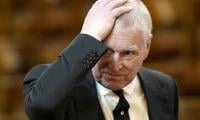Desperate for IMF bailout: Second time in history, SBP hikes interest rate to 20pc
KARACHI: The State Bank of Pakistan (SBP) Thursday raised its benchmark interest rate by 300 basis points to a 26-year high as the crisis-stricken Pakistan aims to persuade the International Monetary Fund to disburse the critical $1.1 billion funding.
Ending a week of speculation and contrary to market forecasts, the SBP’s Monetary Policy Committee (MPC) hiked the policy rate to 20 percent — the highest level since October 1996.
The central bank has elevated rates by 10 percentage points since January 2022.
One of the requirements to revive the IMF bailout, which has stalled for months, is raising the interest rates. Nonetheless, the SBP connected its aggressive rate hike in its monetary policy statement to tame inflation, which surged to 31.5 percent year-on-year in January, the highest annual rate in almost 50 years.
“During the last meeting in January, the committee had highlighted near-term risks to the inflation outlook from external and fiscal adjustments. Most of these risks have materialized and are partially reflected in the inflation out-turns for February,” the SBP said in a statement.
The MPC noted that the recent fiscal adjustments and exchange rate depreciation have led to a significant deterioration in the near-term inflation outlook and a further upward drift in inflation expectations, as reflected in the latest wave of surveys, it said.
“The committee expects inflation to rise further in the next few months as the impact of these adjustments unfolds before it begins to fall, albeit at a gradual pace,” it added.
The SBP expects average inflation this year to be in the range of 27-29 percent against the November 2022 projection of 21-23 percent.
“In this context, the MPC emphasized that anchoring inflation expectations is critical and warrants a strong policy response.”
Moreover, the MPC changed the date of its upcoming meeting from April 27 to April 4.
The MPC noted that while the current account deficit has decreased and core inflation has increased since the last meeting, the foreign exchange reserves cover is still insufficient, which caused the policy rate to climb.
“The MPC, nonetheless, reiterated its earlier view that the short-term costs of bringing down inflation are lower than the long-term costs of allowing it to become entrenched,” it said.
“Barring unexpected future shocks, the MPC noted that Thursday’s decision had pushed the real interest rate in positive territory on a forward-looking basis. This will help anchor inflation expectations and steer inflation to the medium-term target of 5-7 percent by end-FY2025.”
The SBP Governor, Jameel Ahmad, highlighted that at the start of FY2023, the financing requirement was around $33 billion, which included $10 billion of the current account deficit and $23 billion principal debt repayments, according to Topline Securities, who cited a post-monetary policy analysts briefing.
“Out of the $23 billion debt repayment, $15.8 billion has already been settled through rollover and repayment. Out of the remaining $7.2 billion, the SBP is hopeful that rollover of around $4.3 bn will be done and the actual repayment would be around $2.9 billion for which financing would need to be arranged,” the governor said.
He believes that given the global economic situation and delay in the IMF programme, rolling over debt would be challenging unless Pakistan swiftly completes reforms and gets the IMF on board.
On the IMF 9th Review, the discussions are ongoing with the IMF, as per the SBP. However, the governor also highlighted that targets for net domestic asset and net international reserves were met. The SBP said fiscal consolidation was necessary for monetary policy to control inflation. If there is no fiscal slippage going forward, then the target for inflation can’t be met.
The total size of outstanding open market operation injection is Rs6.5 trillion. The purpose of doing this is to keep short-term interest rates aligned with the policy rate, according to the SBP.
The governor stated that the Ministry of Finance was evaluating actions against banks for higher forex income. However, in case of no fiscal action, regulatory action will be taken against banks.
-
 Elon Musk To Introduce New Open-source Algorithm For ‘X’
Elon Musk To Introduce New Open-source Algorithm For ‘X’ -
 Jennifer Lawrence Faces Backlash For Rehoming Dog After Incident With Son
Jennifer Lawrence Faces Backlash For Rehoming Dog After Incident With Son -
 Prince William Gears Up For A Slap To The Face As Prince Harry Awaits Second Win
Prince William Gears Up For A Slap To The Face As Prince Harry Awaits Second Win -
 ‘High School Musical’ Alum Matt Prokop Arrested On Child Pornography Charges
‘High School Musical’ Alum Matt Prokop Arrested On Child Pornography Charges -
 Paris Hilton Gets Candid About Britney Spears' Wellbeing
Paris Hilton Gets Candid About Britney Spears' Wellbeing -
 Prince Harry’s Return To The UK With Archie, Lilibet: ‘Will Meghan Finally Pull The Trigger?’
Prince Harry’s Return To The UK With Archie, Lilibet: ‘Will Meghan Finally Pull The Trigger?’ -
 Naomi Watts Gets Real About Impact Of Menopause On Her Eyes
Naomi Watts Gets Real About Impact Of Menopause On Her Eyes -
 Fears Mount Against Prince Harry: ‘He’ll Record So That He Can Use Every Word’
Fears Mount Against Prince Harry: ‘He’ll Record So That He Can Use Every Word’ -
 Kristen Stewart Gets Honest About Future Plans
Kristen Stewart Gets Honest About Future Plans -
 Andrew Mountbatten-Windsor Under Fresh Scrutiny Over Royal Lodge
Andrew Mountbatten-Windsor Under Fresh Scrutiny Over Royal Lodge -
 'The West Wing' Actor Timothy Busfield Faces Arrest Warrant Over Allegations Of Child Sexual Abuse
'The West Wing' Actor Timothy Busfield Faces Arrest Warrant Over Allegations Of Child Sexual Abuse -
 Mike Tindall Shares Photos With Wife Zara And Prince Harry's Friend
Mike Tindall Shares Photos With Wife Zara And Prince Harry's Friend -
 Iman Honours David Bowie On His 10th Death Anniversary With New Tattoo
Iman Honours David Bowie On His 10th Death Anniversary With New Tattoo -
 Zara Larsson Makes Provocative Political Statement
Zara Larsson Makes Provocative Political Statement -
 Danielle Brooks Recalls Hilarious Daughter Moment
Danielle Brooks Recalls Hilarious Daughter Moment -
 Tom Blyth Explains Rationale Behind Choosing 'lighter' Roles
Tom Blyth Explains Rationale Behind Choosing 'lighter' Roles



